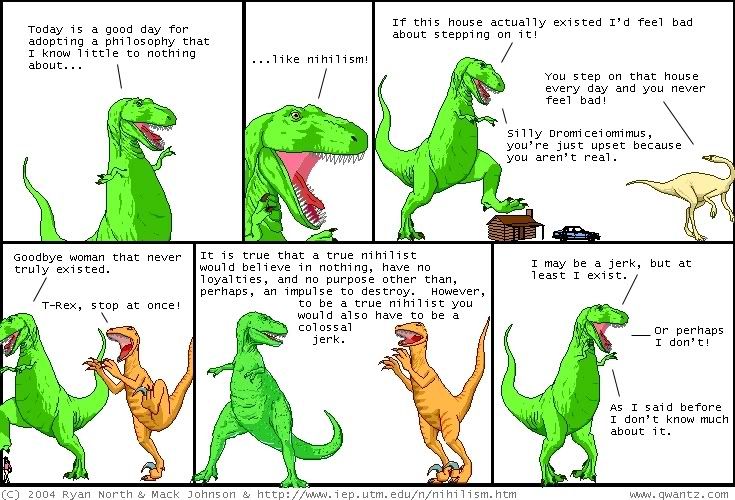In his explanation on how morals were created, Nietzsche makes a distinction about when the “bad” in good vs bad dichotomy became “evil”. After the Slaves inverted the Noble Mode of Valuation during the Slave Revolt those previously seen as “bad” (e.g weak, ugly, sick) were now the moral ones, and the strong who expressed their strength against the weak were no longer seen as good. The belief in the self is a crucial concept the Slaves had to use to perpetuate their ideas. In separating the person from the action you can then hold them morally accountable for their actions because they would have the choice to act otherwise. To put that into more simple terms--the doer is not the deed.
Nietzsche did not believe in the concept of self or a subject. He believed that a subject of the action did not exist and that we only experience the actions, being and doing of a person. But does that mean that I am not really seeing them? During class it was very difficult for me to try to understand this point of view when Dr. Johnson was describing it. I still would not say I agree with Nietzsche, but after giving it some thought I understand his idea better now. I started to think about how we are we an expression of our actions. Any time I see one of my friends they literally must be doing something, even if that is simply being/existing, and that makes up a character or a personality that I know them to have. In that sense I could see how the acting, being, and doing makes you who you are. The ideas I have of my friends comes from how they express themselves to me. But I also think that the self also dictates the acting, being and doing.
Basically I am as confused as I sound...this has been my thought process in trying to wrap my head around this topic.
Nietzsche did not believe in the concept of self or a subject. He believed that a subject of the action did not exist and that we only experience the actions, being and doing of a person. But does that mean that I am not really seeing them? During class it was very difficult for me to try to understand this point of view when Dr. Johnson was describing it. I still would not say I agree with Nietzsche, but after giving it some thought I understand his idea better now. I started to think about how we are we an expression of our actions. Any time I see one of my friends they literally must be doing something, even if that is simply being/existing, and that makes up a character or a personality that I know them to have. In that sense I could see how the acting, being, and doing makes you who you are. The ideas I have of my friends comes from how they express themselves to me. But I also think that the self also dictates the acting, being and doing.
Basically I am as confused as I sound...this has been my thought process in trying to wrap my head around this topic.


















